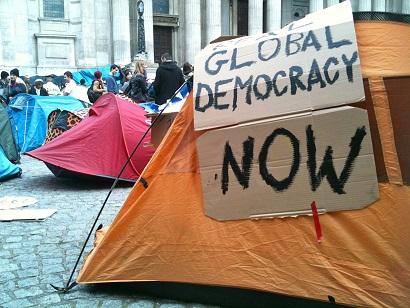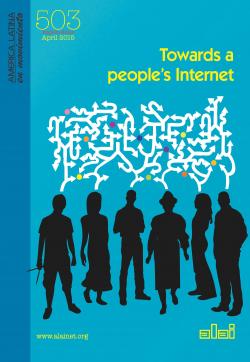The democratic challenge of Internet
- Análisis

| Article published in ALAI’s magazine No. 503: Towards a people's Internet 21/05/2015 |
The notion “Internet Governance” is an outcome of the World Summit on the Information Society (WSIS) which has taken place in two phases, in Geneva (2003) and in Tunis (2005). In Tunis, the following “working definition” was adopted: “the development and application by governments, the private sector and civil society, in their respective roles, of shared principles, norms, rules, decision-making procedures, and programmes that shape the evolution and use of the Internet.” This “working definition” consists of two main aspects: On one hand, there are words which give the term “Internet Governance” its meaning, that is: “the development and application... of shared principles, norms, rules, decision-making procedures, and programmes that shape the evolution and use of the Internet.”
The other aspect is a political assertion about who is in charge of this “Internet Governance”: “governments, the private sector and civil society, in their respective roles”. While it has been asserted elsewhere in the WSIS outcome documents that Internet Governance should be “democratic, with the full involvement of governments, the private sector, civil society and international organizations”, it was not explained how the principle that Internet governance should be democratic can be implemented in practice. The assertion about “full involvement” of all kinds of stakeholders may sound good, but it reflects actual reality only in pretense, not in truth: Since well before the time of WSIS and still today, Internet-oriented private sector companies together with an “Internet technical community” of engineers (who largely work for the same private sector companies) are largely the only ones who have in actual reality “full involvement” in Internet governance.
To a very large extent, it is exactly the viewpoints and concerns of this group of people and businesses who shape the evolution of the Internet and how it can be used, for example through the work of the Internet Engineering Task Force (IETF). The set of viewpoints is much larger at some discussion-only fora like the UN's annual Internet Governance Forum (IGF). However, there are no effective mechanisms for making the actual practices of Internet governance, -- i.e. what actually shapes the evolution and use of the Internet --, take into account the full variety of concerns that are expressed at the IGF. In the reality of the current Internet governance arrangements, among all the possible viewpoints which can be expressed for example at the IGF, there is little if any concrete effect from saying anything that does not resonate directly with the personal values of the “Internet technical community” of engineers, who as a group single-handedly have the power to take things forward or not. This situation is not democratic at all. In the absence of any formal democratic structures in Internet governance, there is no way to push topics of social and economic justice which most engineers are not particularly interested in and which could easily go against the economic interests of their current or potential future employers.
I need to clarify here that I mean the word “democratic” literally, similar to how for example an election is not automatically a democratic process, but if appropriate care is taken in regard to parameters like (1) how the candidates are determined, (2) who has the right to vote, (3) practically enabling these people to exercise their right to vote, and (4) preventing ballot fraud, then a vote can be appropriately referred to as a “democratic election”. The literal meaning of δημοκρατία (dēmokratía), in modern language “democracy”, is that “it’s the people who have the power to rule”. This is since ancient times seen in contrast to “the rule of an elite”, the ancient Greek term for the latter being ἀριστοκρατία (aristokratía). In relation to the Internet, the “Internet technical community” is playing the role of an aristocracy, while some organizations are so powerful that they are like kings who can essentially do whatever they want. Examples include Google, Facebook, Microsoft and the NSA.
This would not be a big problem if the Internet was still of relatively minor significance, like it was in the beginning. However now the Internet is facilitating a very significant transition of human societies to a state of organization which is much more globalized and much more ICT-based than anything that we have experience with. We need to make sure that democracy, in the literal sense of the word as explained above, will survive this transition. A big challenge here is that the idea of directly applying the existing, state-based processes of democracy (which can be described as partial or full implementations ―of differing quality― of the idea of democracy, in the context of nation states) to Internet governance is not attractive at all: The idea of representative democracy is that since in today's world, the overall complexity of the set of governance needs is so great, the citizens delegate the tasks of governance to specialists (the executive and judicial branches of government) and to a parliament that oversees the work of the executive and that -- by means of laws -- directs the work of the judicial branch, i.e. the court system.
This system is at risk of breaking down when too many of the citizens don't trust any politicians of democratic political parties that stand for election (a situation known as “crisis of democracy”, which is unfortunately widespread especially in many “Western” countries.) Also, the parliament-based democratic system cannot work in relation to Internet governance when none of the big mainstream political parties propose any candidates to become members of parliament who have actual understanding and competence in the area of Internet governance. When politicians fail to provide trustworthy competence, foolish populism will prevail. Part of this problem is that it is currently quite difficult to gain any understanding and competence in the area of Internet governance which is not based on the value system of the “Internet technical community” and an ideology of “multistakeholder governance” which is essentially about preserving the current power structures of Internet governance. For example, one huge attractor of attention among people who have an interest in learning about Internet governance is the Internet Corporation for Assigned Names and Numbers (ICANN) which, besides some more deeply technical matters which are not directly visible to end users, decides about the creation of top-level domain names like “.shop” or “.pharma” and about the rules which apply to such domains names. One danger here is that the contract with ICANN which domain-name registrars must accept might effectively give global scope to some unfortunate aspects of US law.
ICANN has a lot of money, and it uses this money to attract a lot of people into its processes. While (unlike in some other processes of Internet governance) non-technical concerns can be brought up and made subjects of discussion, the whole structure of what ICANN does is directed to ensuring that the decisions in relation to assigned “names and numbers” which need to be taken will actually get taken. ICANN's name is not misleading, its scope is really limited to this. Of course it is in the interests of the people and organizations whom I have described above as a kind of aristocracy that this governance function continues to be provided. From their perspectives, the actual substantive choices which are decided by this governance institution are much less important than the fact that somehow, decisions are taken, and the outcomes are widely accepted, happily or not.
There is no opportunity in ICANN or in any other established Internet governance process to bring up general concerns of social and economic justice in relation to the Internet, and to initiate a corresponding problem-solving process. This should not be seen as surprising: after all, those who currently hold a lot of power in relation to the Internet would have nothing to gain, and potentially a lot to lose, from the empowerment of movements for social and economic justice. It is currently only technical problems and business problems that get solved. In my opinion, there are three things that can and must be done in order to work around this problem which consists in the current lack of problem-solving processes for “information society” problems of social and economic justice: First, we need to insist, at every appropriate opportunity, on actual problem-solving.
Endlessly continuing discussions are simply not good enough. Second, we need to create a space where a socio-economic problem-solving discourse of high quality can take place without interruption from those who would prefer the problems of social and economic justice to remain unsolved. In my opinion, the Internet Social Forum should be designed so that it can fulfill this role. Third, we need to directly link this problem-solving work to serious politics, and specifically to the political discourse that takes place in parliaments. In this way, members of parliament will become informed about what really matters in Internet governance. As a consequence, the mainstream political discourse in the media, which pays a lot of attention to what happens in national parliaments, will also become much better-informed.
Norbert Bollow works as an independent consultant on technical matters and on solving business problems. He has also been active for many years in the Free and Open Source Software (FOSS) movement and in broader social justice oriented advocacy related to the Internet. Co-convenor of the Just Net Coalition.
Article published in: Latin America in Movement 503, ALAI, April 2015. “Towards a people’s Internet” http://www.alainet.org/en/revistas/169787
Del mismo autor
- The democratic challenge of Internet 21/05/2015
- El desafío democrático en Internet 30/04/2015
- Las causas profundas de la injusticia social en Internet 28/05/2014
Artículos relacionados
Clasificado en
Comunicación
- Jorge Majfud 29/03/2022
- Sergio Ferrari 21/03/2022
- Sergio Ferrari 21/03/2022
- Vijay Prashad 03/03/2022
- Anish R M 02/02/2022
Internet ciudadana
- Nick Bernards 31/03/2022
- Paola Ricaurte 10/03/2022
- Burcu Kilic 03/03/2022
- Shreeja Sen 25/02/2022
- Internet Ciudadana 16/02/2022









